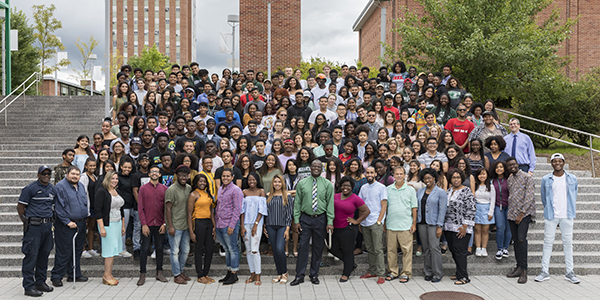Celine Lodge earns Norman R. McConney, Jr. Award for Student Excellence
EOP student is a double major in psychology and nursing

On Dec. 14, 2020, State University of New York (SUNY) Chancellor Jim Malatras celebrated the achievements of 45 students in SUNY’s Educational Opportunity Program (EOP). Each of 49 SUNY campuses had the opportunity to nominate one EOP student for the Norman R. McConney, Jr. Award for Student Excellence, which recognizes students’ academic excellence and strength in overcoming personal obstacles.
Binghamton University’s awardee is Celine Lodge, a double-major in psychology and nursing, who is set to graduate in 2022.
“Winning this award means so, so much,” said Lodge. “It means my hard work is paying off. A lot of times I see that I’m working so hard, but my grade is not showcasing that. So this award means to just keep pushing on because there is someone out there who is noticing my hard work.”
Lodge feels a particular kinship to McConney, for whom the award is named, due to her resolute desire to make a difference in the lives of people who look like her. McConney was a public policy strategist who helped draft the legislation that established the SUNY EOP in 1967. He also oversaw several statewide initiatives to benefit underrepresented New Yorkers, including programs to prepare minority high school students for careers in the sciences and medicine. He also developed and was the lead negotiator for the passage of the bill that created nurse practitioners in New York state.
McConney’s work on the nurse practitioner bill is particularly meaningful to Lodge, who aspires to become a nurse practitioner. In summer 2019, she volunteered at Jacobi Hospital in the Bronx, which serves a very diverse population of patients — only 8% of whom are white, according to the NYC Health + Hospitals 2019 Community Health Needs Assessment. In addition to shadowing nurses and assisting with clerical duties there, Lodge implemented a patient satisfaction survey for patients on the medical/surgical floor where she was stationed.
“I went around to each room and asked the patients how they were feeling with the service they were receiving,” said Lodge. “Then, with that data, I went to the nursing manager. We were able to make sure that the patients were getting the care that they needed not only medically, but also making sure that they were happy. It changed my life because, before, I was interested in either business or nursing, but through that experience, I realized that nursing is my passion.”
Lodge wants to focus her career on women’s health — more specifically the health of Black women, who, according to the Centers for Disease Control and Prevention, are two to three times more likely to die from pregnancy-related causes than white women. It’s not only Black women who are suffering from inferior care, though. A report released by the National Academy of Medicine found that “racial and ethnic minorities receive lower-quality healthcare than white people — even when insurance status, income, age and severity of conditions are comparable.”
These data points led Lodge to apply for the Ronald E. McNair Postbaccalaureate Achievement Program (also known as the McNair Scholars Program), a federal TRIO program for undergraduate researchers in pursuit of a doctoral degree. Lodge was accepted into Binghamton University’s 2020 summer research program and worked with her research mentor, Sharon Bryant, an associate professor and director of diversity, equity and inclusion for the Decker College of Nursing and Health Sciences. Bryant also directs the University’s Science and Technology Entry Program (STEP) and Upward Bound Math and Science (UBMS) program. Her research focuses on the relationship between perceived discrimination in healthcare and practicing preventive health behaviors.
“We were looking at how perceived discrimination within healthcare effects African American individuals,” said Lodge. “It was really devastating to see the statistics on that — if a person feels like they’re being discriminated against, or if they think [they will be discriminated against], they’re going to be more reluctant to get the healthcare they need.”
Lodge said that, particularly in the past year, she’s been distraught by the high mortality rate of African Americans who are diagnosed with COVID-19, and that has also fueled her ambition to pursue nursing.
“I want to help those who look like me,” she said, “and I can’t help them from the outside. I have to be working from within.”
Despite the successful volunteer and research experiences she’s had recently, Lodge said she struggled when she first came to the University. She attended a Bronx high school in that she felt focused only on standardized testing, so coming to Binghamton was a culture shock because she had a lot of catching up to do to reach the academic standards expected of her by faculty. At the time, she also hadn’t yet given much thought to what she wanted to do with her life. On top of that, she has had to worry about financial stability.
“I’m financially independent,” she said, “so it’s been really hard. I know you are not necessarily a product of your environment, but I’ve learned that if you want a good life, you have to push through that and achieve it yourself. Once I realized that, I’ve been going head-first ever since.”
Lodge said EOP has been her lifeline, and she is truly grateful for all of the support she has received from the program and her counselors. None of her successes would have been possible without EOP.
“I’m really feeling so accomplished with being in the Decker School of Nursing, being an EOP student and being of African American descent,” she said. “I’m really excited about what’s in the future, and what more is to come.”
